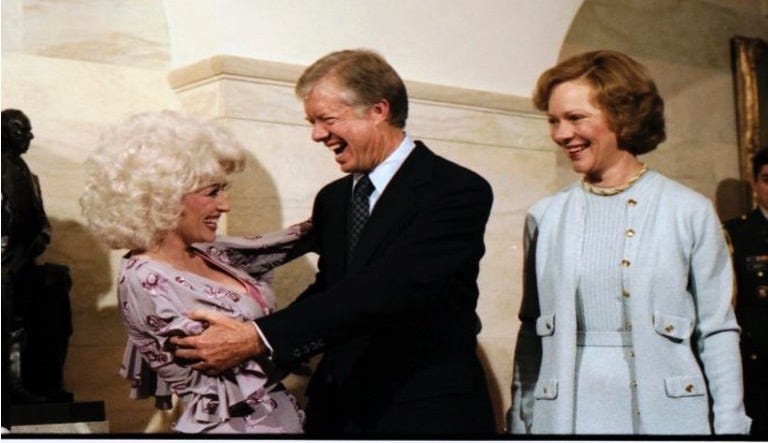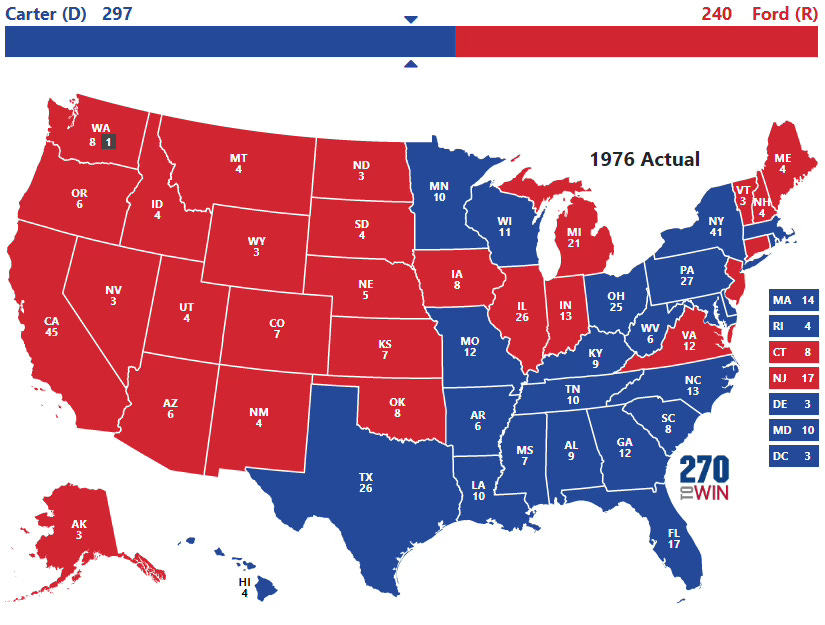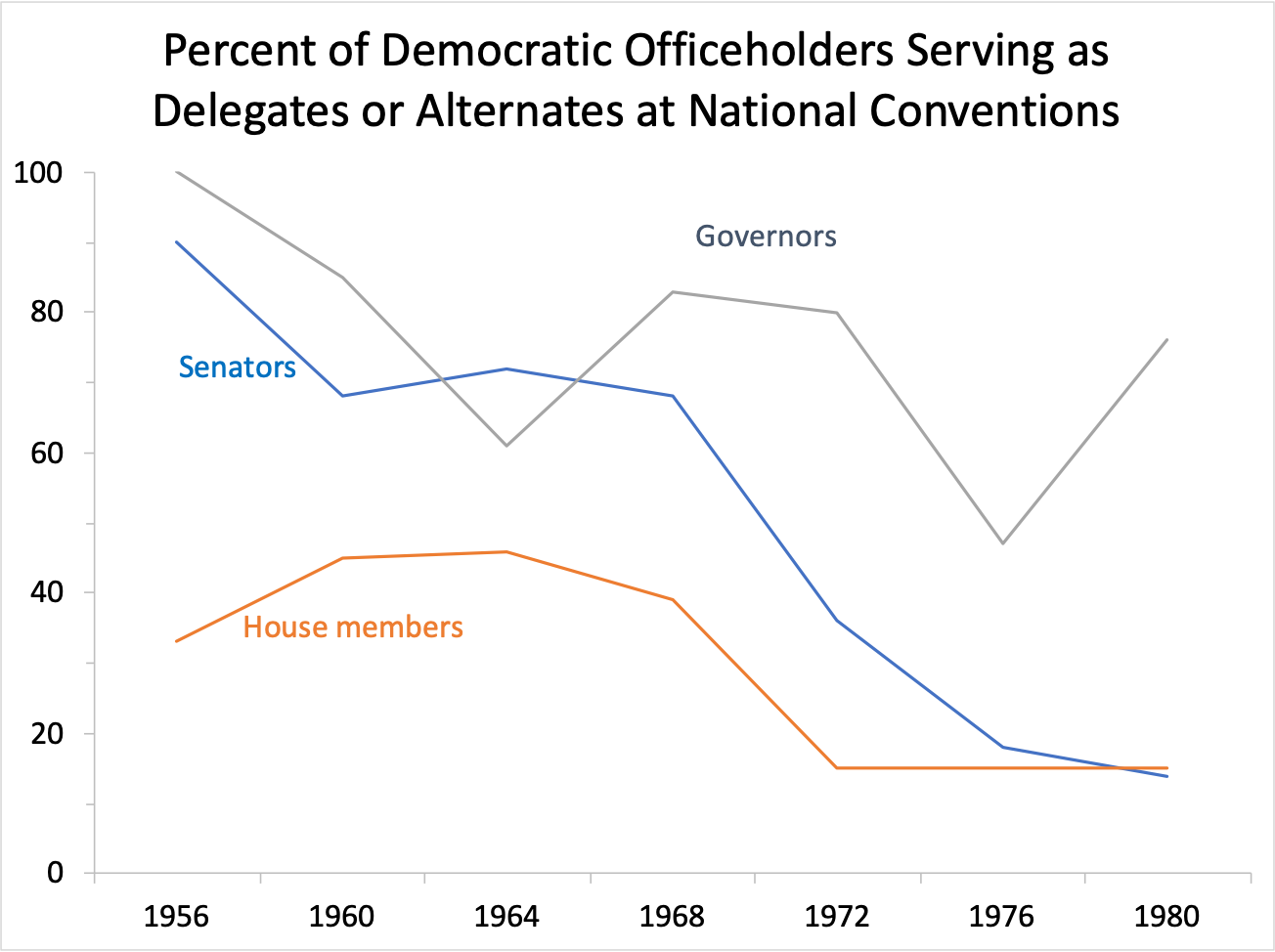Carter's presidency is a failed party story
His presidency was a disappointment, largely because of how he got the job in the first place
The most conventional (and accurate) take on Jimmy Carter, who passed away on Sunday at 100 years old, is that he had a brief and unsuccessful presidency and a long and successful post-presidency. I want to dig in here about why his presidency was so unsuccessful. And basically, it’s a story about the Democratic Party and Carter’s place in it.
Carter was nominated for the presidency in the middle of, and because of, an unusual period in the Democratic Party’s history. Just generally, the 1970s was an era of very low party polarization in US history, which enabled unusual combinations of voters to come together. Look at the map of the 1976 presidential election below. It’s unlike any that came before or after. The Democrat won all of the South (except for Virginia), along with the labor strongholds of Ohio, West Virginia, and Pennsylvania. He lost California, New Jersey, Illinois, and Michigan, and won the presidency anyway. That’s just a weird map.
But there was something else going on within the party. The McGovern-Fraser reforms of the early 1970s had dramatically transformed Democratic Party nominations. We tend to think of these as the reforms that caused an explosion in the number of primaries, but that wasn’t the only thing going on. Those reforms, for a while any way, dealt traditional party elites out of the party’s decisionmaking processes. Democratic members of Congress and DNC members, used to being convention delegates simply by tradition, were no longer guaranteed delegate positions, and were losing those positions to local activists who ran in state primary and caucus systems.
The chart below shows the percentage of Democratic governors, senators, and House members who were serving as delegates or alternates at national conventions from 1956 through 1980. Note the sharp drop after 1968 as a result of the reforms. What this meant was that traditional Washington-based elites lost a lot of influence in the nomination process.
Carter, like George McGovern in 1972, picked up on the dynamics of this new nomination system before the DC elites did. He embraced a “momentum” campaign based heavily on the idea of doing well in the early contests (Iowa and New Hampshire), getting media attention and funding for doing so, and converting those assets into future wins. The other DC-tied Democratic presidential candidates — Scoop Jackson, Mo Udall, and others — were more wedded to the earlier system of impressing party elites. Carter was campaigning like crazy in Iowa before most Americans even knew who he was.
Carter’s nomination campaign was precisely right for the time period. But it came at a cost. As a little-known governor who won the nomination without many ties to the party’s DC establishment, he came into office with few automatic allies. A consequences of the low polarization of the era was that the Democratic Party was far more ideologically diverse then than it is today, and few Democrats in Congress felt obligated to deliver him wins just because he shared their party label.
On top of that was Carter’s own orientation. He regularly butted heads with influential Democrats on Capitol Hill, to the point where it was costing the party policy wins. Carter was a Democratic president with Democratic majorities in both chambers yet delivered very little policy-wise. His beef with Sen. Ted Kennedy (D-MA) got in the way of producing a comprehensive health care reform package that had very good chances of passage. Carter could have done more to advance civil rights laws, but seemed to believe that his own example of not being racist and appointing a diverse array of staff and advisors was sufficient. He seemed either unable to or uninterested in advancing policy change in Congress. As his own press secretary, Jody Powell, remarked, “He went all over the country asking everyone he saw to vote for him for President, but he doesn’t like to call up a Congressman and ask for his support on a bill.”
Carter’s prospects for a second term were doomed by a number of things beyond his control, including high inflation, weak economic growth, an energy crisis, and a hostage crisis in Iran. By his own bad luck, there were no Supreme Court openings during his term. As a result, the only four years of unified Democratic control between the Johnson and Clinton administrations were largely squandered, and Carter had few policy wins to brag on except some neoliberal experiments with airline deregulation and a burgeoning craft beer industry.
But this example shows the importance of parties and party leaders. Without substantial ties to Democratic leaders, Carter was unable to make many needed changes in national law. As noble as his post-presidency was, his presidency is largely remembered in terms of what it could have been.






Rick Perlstein's Reaganland is a fantastic book and an enlightening autopsy of administration of the first modern Democrat. Carter is an object lesson in the reality that you can't please everyone all the time, his policy on draft amnesty exemplifies this. He wanted to do just enough on it to please his voters, to whom he promised amnesty, while not overly alienating the right. The result was a policy that only pardoned a small percentage of draft-dodgers, which did not please his base and enraged the right, for whom any amount of draft amnesty was too much. Barry Goldwater called it "the most shameful moment of any presidency" like, two and a half years after Watergate, lol. That was Carter's whole presidency, just four years of trying to have his cake and eat it too before finding out that the cake was just made of shit the whole time